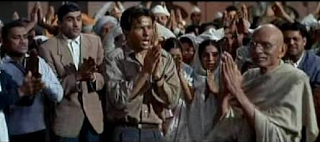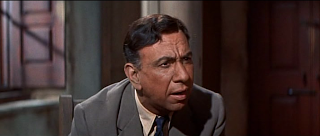 Mark Robson's Nine Hours to Rama (1963) depicts Mahatma Gandhi's assassination through his killer's eyes. Certainly an audacious premise, it tries exploring the wages of fanaticism through a thriller format. Save a few minor missteps, it works.
Mark Robson's Nine Hours to Rama (1963) depicts Mahatma Gandhi's assassination through his killer's eyes. Certainly an audacious premise, it tries exploring the wages of fanaticism through a thriller format. Save a few minor missteps, it works. Nathuram Godse (Horst Buchholz) is an Hindu fanatic who resents Mohandis Gandhi's (J.S. Casshyap) conciliatory attitudes towards Muslims after India's partition. Flashbacks show Godse's hardscrabble life: he lost his father in a riot, romanced the married Rina (Valerie Gearson), became a newspaper editor and joined a nationalist sect. Godse's plot unravels as Delhi Police Superintendent Das (Jose Ferrer) tries to save Gandhi, who's reluctant to accept protection or cancel a prayer meeting.
Based on Stanley Wolpert's novel, Nine Hours to Rama offers a lavish reconstruction. Robson shot on location in India, with expansive crowd scenes, historical recreations and beautiful Panavision photography by Arthur Ibbetson. Robson intersperses thriller dynamics with flashbacks, signaled by Ernest Walter's nifty slow dissolves reminiscent of Orson Welles. Malcolm Arnold contributes an authentically Indian-inflected score, using sitar and percussion to create atmosphere.
Rama isn't strictly accurate: Godse's depicted as the son of a priest radicalized by his father's death, when he was a middle class fanatic who soured on Gandhi as post-independence India fell into chaos. His romance with Rina provides a tasteful foil, casting Godse's reactionary radicalism against his lover's modern-thinking moderation. This only seems false at the end, where Godse wavers in his resolution to kill Gandhi if Rina will elope with him. This twist provides a contrived, though necessary jolt of suspense.
 Thrillers based on real assassinations must avoid the shortcoming of an inevitable ending. Rama is no Day of the Jackal; its killer isn't a remorseless professional but a bumbling activist who escapes through craftiness and dumb luck. Police arrest his compatriots, an argument with a hotel keeper nearly lands him in trouble. He hides with a prostitute (Diane Baker) who steals his gun and bluffs his way past an inquisitive cop. Through sheer determination (and Gandhi's fatalism), he narrowly keeps his date with destiny.
Thrillers based on real assassinations must avoid the shortcoming of an inevitable ending. Rama is no Day of the Jackal; its killer isn't a remorseless professional but a bumbling activist who escapes through craftiness and dumb luck. Police arrest his compatriots, an argument with a hotel keeper nearly lands him in trouble. He hides with a prostitute (Diane Baker) who steals his gun and bluffs his way past an inquisitive cop. Through sheer determination (and Gandhi's fatalism), he narrowly keeps his date with destiny.It's possible many viewers won't sympathize with Godse, anymore than they'd embrace a Lee Harvey Oswald or James Earl Ray biopic. That much of the cast are Caucasian actors in brownface presents another hurdle, though Robson's sober staging avoids caricature or overt offensiveness. The parallel plots generate suspense, with Das trying to reason with the Mahatma and Godse edging closer. Robson mounts the finale with explosive skill, with Godse edging through a teeming crowd, struggling to maintain composure. The ending is affecting for all its inevitability.
Horst Buchholz is surprisingly good, playing Godse as hot-blooded and angry, channeling personal resentment into a greater cause. Jose Ferrer's Superintendent is a one-note foil. Brits Robert Morley and Harry Andrews are less convincing as other Indian officials. Valerie Gearon is compellingly tough-minded, Diane Baker fighting shame and bewilderment. J.S. Cashhyap is a dead ringer for Gandhi, making the most of limited screen time.
Whether through its alienating premise or awkward casting, Nine Hours to Rama fell through the cracks. Nonetheless, it holds its own against later, better-known assassination dramas.

